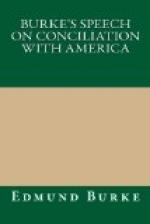The next Resolution relates to the Courts of Admiralty. It is this.
“That it may be proper to regulate the Courts of Admiralty or Vice Admiralty authorized by the fifteenth Chapter of the Fourth of George the Third, in such a manner as to make the same more commodious to those who sue, or are sued, in the said Courts, and to provide for the more decent maintenance of the Judges in the same.”
These courts I do not wish to take away, they are in themselves proper establishments. This court is one of the capital securities of the Act of Navigation. The extent of its jurisdiction, indeed, has been increased, but this is altogether as proper, and is indeed on many accounts more eligible, where new powers were wanted, than a court absolutely new. But courts incommodiously situated, in effect, deny justice, and a court partaking in the fruits of its own condemnation is a robber. The Congress complain, and complain justly, of this grievance.
These are the three consequential propositions I have thought of two or three more, but they come rather too near detail, and to the province of executive government, which I wish Parliament always to superintend, never to assume. If the first six are granted, congruity will carry the latter three. If not, the things that remain unrepealed will be, I hope, rather unseemly incumbrances on the building, than very materially detrimental to its strength and stability.
Here, Sir, I should close, but I plainly perceive some objections remain which I ought, if possible, to remove. The first will be that, in resorting to the doctrine of our ancestors, as contained in the preamble to the Chester Act, I prove too much, that the grievance from a want of representation, stated in that preamble, goes to the whole of legislation as well as to taxation, and that the Colonies, grounding themselves upon that doctrine, will apply it to all parts of legislative authority.
To this objection, with all possible deference and humility, and wishing as little as any man living to impair the smallest particle of our supreme authority, I answer, that the words are the words of Parliament, and not mine, and that all false and inconclusive inferences drawn from them are not mine, for I heartily disclaim any such inference. I have chosen the words of an Act of Parliament which Mr. Grenville, surely a tolerably zealous and very judicious advocate for the sovereignty of Parliament, formerly moved to have read at your table in confirmation of his tenets. It is true that Lord Chatham considered these preambles as declaring strongly in favor of his opinions. He was a no less powerful advocate for the privileges of the Americans. Ought I not from hence to presume that these preambles are as favorable as possible to both, when properly understood; favorable both to the rights of Parliament, and to the privilege of the dependencies of this Crown? But, Sir, the object of grievance in my Resolution I have not taken




